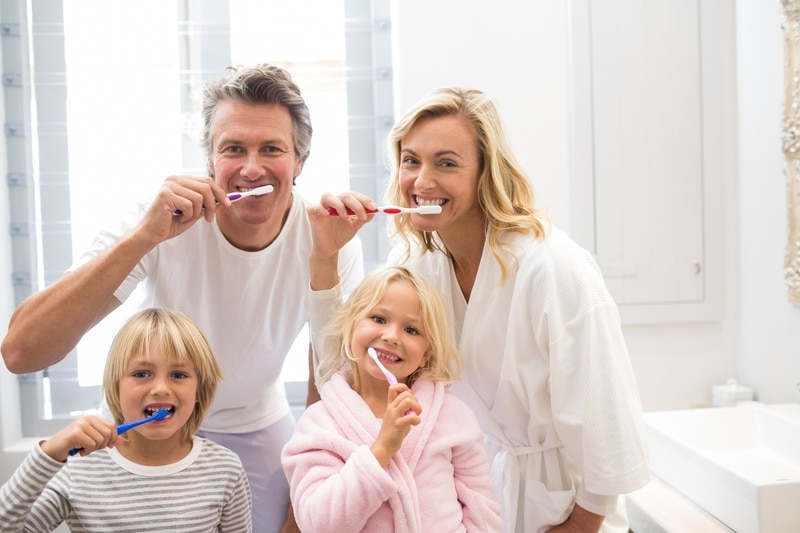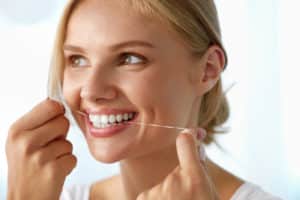Taking Care of the Adult Teeth All Life Long


Many elderly have missing teeth or total tooth loss. You may wonder if that is something that will inevitably happen. However, it’s not. You can keep your natural teeth all life long with the right oral health habits and frequent dental visits. These are tips for taking care of baby teeth, adult teeth and the teeth during all those transitioning years!
Taking Care of the Baby Teeth
Infant oral care is quite easy once you know how to do it. Here are some things to know about your little one:
- As soon as the first baby tooth comes in, it needs to be brushed. Use a rice-sized amount of safe infant/child toothpaste.
- Brush your infant’s tooth/teeth at least twice a day, or after meals.
- Never leave a baby with a bottle for naps or during the night. Sugars in the milk (both breast and formula) cause tooth decay very quickly.
- Wipe an infant’s gums and smile with a damp cloth to remove milk sugars and food particles after feedings.
- Start them off with dental visits sometime between 18 months and 3 years to check for tooth decay or oral health care problems.
- Use a gum brush for small infants and graduate to an infant toothbrush as they get a bit older.
- No sugar. Children should have less than 6 grams of sugar in a day and infants should have none. Never put soda, sports drinks or sugary drinks in cups or bottles for infants.
- Brush and floss your child’s teeth for the first few years until they can do it well on their own.

Childhood Years to Teen Years
Children may not be able to brush their teeth properly until they are 3 or older. It takes time for them to develop the dexterity they need in their hands to make all the brushing movements. When a child can hold utensils well and eat alone with those utensils, they are definitely ready to start transitioning to brushing their teeth on their own.
During this time, help them to know how to hold a toothbrush correctly and hold their hand as you teach them the brush strokes and the movements. Teach them to put about a pea-sized amount of toothpaste on their toothbrush. As a person ages, they may use more toothpaste. As soon as the spaces between the teeth become smaller with a child, flossing should start. Flossers are great tools that children can learn until they can floss with string floss properly. Mouthwash and fluoride should only be used by the direction of a dentist in a child.
What if your child doesn’t want to take care of their teeth with brushing and flossing? Try these tips:
- Get bright, colorful child toothbrushes that have their favorite characters on them.
- Sing a song while they brush.
- Have your child watch a 2-minute video clip of something they like as they brush for those 2 minutes.
- Make it a game! Brush along with them and see who can get cleaner teeth.
- Have a reward chart for children where they get stars, stickers or earn small prizes over time for brushing well.
- Let a child practice on you. Show them how you take care of your teeth and then have them practice on your teeth and theirs.
Orthodontic Treatment Helps the Health of Your Teeth
As children grow older, their mouth is getting bigger as they get taller. The baby teeth will start to fall out starting around age 5, and adult teeth will start to come into the mouth. If your child has crooked teeth as a small child, they may need orthodontic treatment before the adult teeth come in.
As the baby teeth fall out, adult teeth will come in to replace those teeth. There will be 32 adult teeth total over the years that teens and pre-teens are getting their adult teeth, which include the 4 wisdom teeth. There will be more teeth coming in to replace the 20 baby teeth because there is more room in the mouth. If there are speech or eating problems present in your child, definitely consider orthodontic treatment to correct bite and alignment. Then, when all the permanent teeth come in, consider having them get orthodontic treatment to just align the teeth. A straight smile is one that is much easier to clean, which can help a child to have a healthy mouth all life long.

Your Adult Teeth
Many adults struggle with proper oral hygiene, even though most people know that brushing and flossing is important. We provided so many tips for children because oral health care starts when you’re young. Those who teach children proper oral care early-on can expect to have children and adults that generally take better care of their teeth. Studies show that oral health care problems lead to the most chronic and prevalent diseases that Americans face. Gum disease alone affects at least 64.7 million Americans. Tooth decay (cavities) affect even more.
You avoid these with the simple habits we’ve mentioned. As a teen or adult, brush your teeth at least twice a day, for 2 minutes at a time. Floss 1-2 times a day, making sure to get up into your gum line. Scrape the teeth gently as you move the floss down your teeth. Limit your sugar intake throughout the day, as sugar makes plaque, which decays your teeth. Teens and adults can use mouthwash to kill decay-causing bacteria. Fluoride treatments and dental sealants may also be advised by a dentist. To know for sure, schedule a comprehensive dental exam and cleaning with a dentist, and make sure you have these appointments at least every 6 months. These measures will help ensure you don’t have tooth loss as you age.
Tooth Loss: Is It Inevitable?
Tooth loss is not inevitable. There are plenty of people that live their entire life with their natural teeth because they took care of their smile. That can be you! For more tips on taking care of your pearly whites, call Dr. Ania’s office today at 303-443-0998!


